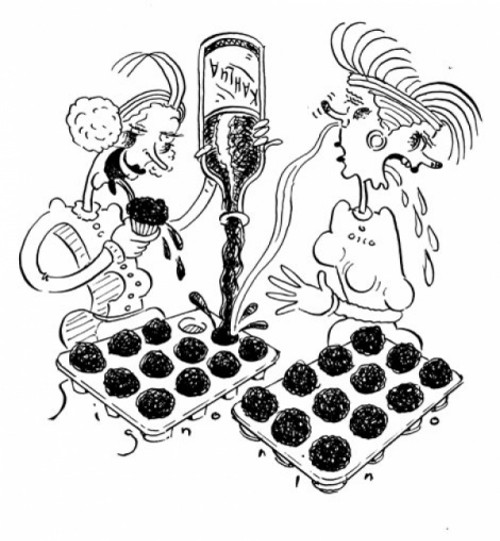Total shot in the dark, Charlie, but I’m thinking if you’re hypersensitive to alcohol, you should avoid products with alcohol in them. But you don’t want smart-ass remarks, you want science. Coming right up.
First, let’s examine the facts. According to the Dear Abby letter, the recipe called for half a cup of Kahlua and yielded 30 cupcakes. Kahlua is 40 proof, so a half-cup contains 0.8 ounces of alcohol—about one and a quarter beers’ worth. Even if all the alcohol remained after baking, you’d have to eat two dozen cupcakes to get the equivalent of one beer. Would the average person then be drunk? No, the average person would then be sick from all those fricking cupcakes.
The next question is how much alcohol burns off in the oven. We identified two ways of getting at this. The first is via research from the U.S. Department of Agriculture, which tests foods and beverages to find out how many nutrients are lost during cooking. (Yes, the USDA considers alcohol a nutrient. No immediate application for this knowledge springs to mind, but I’d remember it just the same.) According to the USDA, an open alcoholic beverage sitting out overnight will lose 30 percent of its alcohol content to evaporation. Stirring whiskey into coffee removes about 15 percent of the alcohol in it, and liqueur used to make a flambé such as crepes Suzette loses about 25 percent. Baking or simmering an alcoholic beverage for 15 minutes vaporizes 60 percent of the alcohol; it takes two and a half hours of cooking to reduce the alcohol content by 95 percent.
But enough with the library work. The combination of alcohol and cupcakes made this a natural for investigation by Straight Dope Labs. My assistants Una and Fierra obtained some saliva-activated blood alcohol measuring strips and proceeded as follows:
1. As a control, they tested their blood alcohol concentration (BAC) while stone sober: 0.00 percent.
2. Next they each consumed one True Blonde ale, alcohol content 5.3 percent by volume, from Ska Brewing Company, proud sponsor of the Straight Dope podcast. Their BAC subsequently tested at 0.04 percent.
3. The two then made 36 cupcakes using a recipe calling for three-quarters of a cup of Kahlua, plus another quarter cup for the frosting. They calculated that the batter and frosting together should contain at most 1.8 percent alcohol by weight. Based on the ale phase of the experiment, they hypothesized that eating three cupcakes at a sitting, even if no alcohol were lost due to evaporation or cooking, would produce at most a BAC of just under 0.01 percent.
4. Six trials were conducted over a two-day period. Each trial consisted of eating three cupcakes and testing BAC an hour later. Results: no trace of alcohol in either experimenter at any point. What became of the leftover Kahlua I didn’t ask.
5. Meanwhile, the cupcakes themselves were tested for alcohol content. The USDA research led us to believe about 46 percent of the original alcohol would remain. Samples of the cake and frosting were mixed with just enough water to make a paste and applied to the BAC strips. The frosting registered 0.04 percent, the cake roughly 0.30 percent. So the cupcakes had some residual alcohol in them, but seemingly not much.
Is there such a thing as hypersensitivity to alcohol? Yes, but that doesn’t typically mean very small amounts make you drunk. As we’ve discussed here before, many east Asians suffer from an enzyme deficiency that inhibits their ability to metabolize an alcohol by-product called acetaldehyde. Drinking can result in “Asian flush,” characterized by a flushed face and sometimes a racing pulse and vomiting-hardly drunkenness in the usual sense. What’s more, the trigger amount is on the order of half a beer, far more than you’d get from a spiked cupcake.
Further perusing the medical literature, we find accounts of alcohol-induced anaphylactic shock, essentially a severe allergic reaction. The most common symptom is hives, but others include dizziness, slurred speech, nausea, wheezing, diarrhea, and abdominal pain. My guess: if you experience all this, you don’t think you’re drunk, you think you’re going to die. (One near-fatal case of anaphylaxis due to modest alcohol consumption has been reported.)
I guess it’s conceivable the supposedly tipsy coworker had a mild allergic reaction along these lines. But yes, it’s more likely that her cupcake issues were all in her head.
Send questions to Cecil via StraightDope.com or write him c/o Chicago Reader, 11 E. Illinois, Chicago 60611. Subscribe to the Straight Dope podcast at the iTunes Store.
More by Cecil Adams
-
This Is the End, My Friend
This week's Straight Dope marks the last appearance of the column as the Teeming Millions have known it for the past 45 years.
- Jul 11, 2018
-
Do Brain Supplements Do Anything?
Brain Drain
- Jul 4, 2018
-
Is flying really worse for the environment than driving?
Planes and Trains
- Jun 27, 2018
- More »




